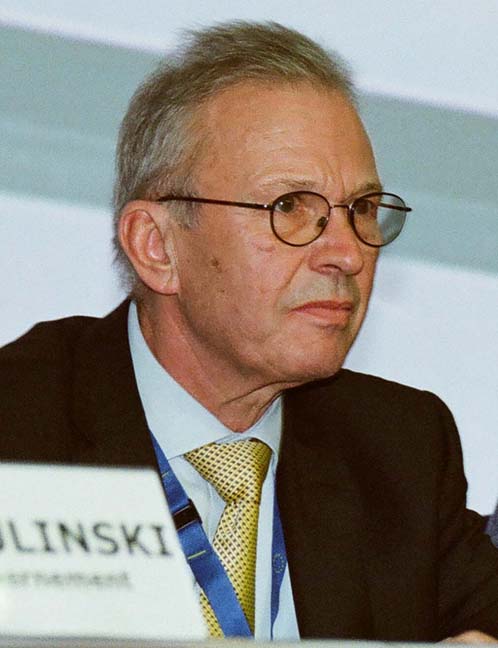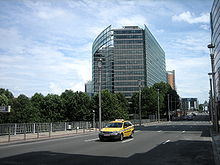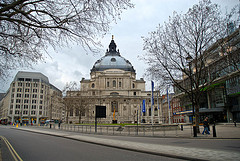 Paul Weissenberg, deputy director-genreal, EC DG Enterprise
Paul Weissenberg, deputy director-genreal, EC DG EnterpriseLast week’s Conference on EU Space Policy in Brussels — under the theme, “What direction for Europe in space between now and 2020?” — featured spirited calls for closer cooperation and the formation of a united front as Europe moves towards early Galileo services at the end of this year.
Falling somewhere between a team-building exercise and a love-fest, the amiable and optimistic sentiments expressed by European space leaders reflected a marked change of tone from those in recent months.
Last week’s Conference on EU Space Policy in Brussels — under the theme, “What direction for Europe in space between now and 2020?” — featured spirited calls for closer cooperation and the formation of a united front as Europe moves towards early Galileo services at the end of this year.
Falling somewhere between a team-building exercise and a love-fest, the amiable and optimistic sentiments expressed by European space leaders reflected a marked change of tone from those in recent months.
All of Europe’s strengths — and unresolved challenges — were on the table, making for a refreshingly healthy airing of views. As for Galileo specifically, all parties seem to be on the same page for an end-of-year rollout of early services, based on a 10-satellite constellation (including the 4 in-orbit validation or IOV spacecraft already launched) to be in place by December.
The program was opened by no less a figure than European Commission President José Manuel Barroso, who said (in a recorded message), “Our European space programs are fully on track.”
Good news for those who have been watching from the sidelines as the various Galileo leaders, as recently as last fall, seemed on the verge of pointing fingers. And especially good news for those (i.e., businesspeople) whose confidence is supposed to be driving the economic payback that is Galileo’s very raison d’etre.
Tajani, Dordain Trade Compliments
At last month’s European Space Agency press conference in Paris, the agency’s Director General Jean-Jacques Dordain seemed to say that, once ESA has put the next six satellites into orbit, the responsibility for delivering Galileo early services would fall on the European GNSS Agency (GSA).
Apparently this raised a few eyebrows. Some people thought Dordain meant that ESA would wash its hands of the situation once its part was done.
Another reading his comments, and a much more sensible one perhaps, was to say that he was acknowledging the GSA publicly as a full-fledged and worthy partner, owning its role as newly established Galileo service provider, with the authority and wherewithal to get the job done.
“I believe the GSA will deliver its early services,” were his exact words at the press conference last month in Paris.
In his opening presentation in Brussels, European Commission Vice-President Antonio Tajani headed off at the pass any notion of an ESA-GSA gap, saying, deliberately, “The GSA and ESA will work together for early services.”
Speaking in French, Tajani was convincing in his demonstration of brotherly feeling towards the man on whom all depends — at least on the technical level. He thanked Dordain for the new launch schedule that will underpin the on-schedule delivery of early Galileo services.
“Galileo will move forward this year,” Tajani said. “There will be six new satellites, bringing the total to 10 in orbit. Mr. Dordain has told me, and he confirmed to me again today, there will be three launches in 2014. The first will come in June. Two satellites have passed the necessary tests. We need to keep this up, we must continue to raise our game.”
Under ESA’s current plan, the other two-satellite launches would occur in October and December on Russian Soyuz rockets, barring any last-minute technical problems. But ESA launch manifest is crowded this year, and a four-satellite launch on an Ariane 5 rocket could be an option.
As for the rough patches of 2013, all parties now seem to be back on the same page. That’s not to say the scars don’t itch a little. Tajani invoked the interests of the public as a good reason for all parties to come back together:
“We must put services first,” he said. “This program must be built around the users and their needs.”
public, Tajani suggested, does not care about who does what, and they don’t understand delays.
“We must reevaluate our relationships, the Commission and ESA and others; we must learn to understand each other, and our different histories,” he added.
Indeed, ESA and the EU are in the midst of an ongoing re-visioning of their relationship, first enshrined in an “framework agreement” in force since May 2004 and later in “delegation agreements” sorting out responsibilities for Galileo and the Copernicus Earth observation programs. Today (January 6, 2014) the EC issued a “progress report” on establishing appropriate relations between the two entities and talks on a new Galileo delegation agreement are set to start in March.
Tajani threw an unexpected twist into the bobsled run near the end of his speech when he declared, flatly, “I am not optimistic. . . .”
The pause that followed was quite clever, causing the audience to hold its collective breath for a moment. Then, “. . . I’m determined!” he finished.
Such an impression was made that the words “I’m determined,” or “I am also determined,” or “I’m determined too,” were hastily incorporated into the presentations of more than a few other speakers over the course of the day.
Only one of these subsequent references to determination managed to jar, when Tajani’s own subordinate Daniel Calleja Crespo said, “I think we have to be both determined and optimistic.”
All Together Now
Fortuitously, Dordain was able to speak immediately after Tajani. Originally the conference organizers had slated him to speak during a later session, but apparently he requested a bump up to the opening session.
Only fitting, some would say.
Dordain, also delivering his remarks in French, started by thanking Tajani for the goods news.
“I share totally what he said,” Dordain began. He then struck one of the major themes of the event, saying, “I am here to talk about Europe — and success.”
He called off a list of substantial accomplishments in space endeavors: “Rosetta, Gaia, Ariane, Vega — countless examples of things European industry is doing that others can’t — the ATV, AlphaSat — unique technologies in the world.”
No doubt about it, Europe has an impressive record in space programs, and it’s still right up there.
And now we have Galileo,” said Dordain.
“But,” he warned, “our competitors are very active — new and traditional competitors. The U.S. has the Antares launcher, but there is also a new Indian launcher. In navigation, the U.S. is putting in place its new-generation GPS. GLONASS is almost ready. So, we have no time to lose.
“We must innovate now and continue to innovate” Donrdain continued. “And in all areas of activity.” Not just in knowledge, not just in technologies, he insisted, but also in services, and in governance and in organization: “Innovation in all.”
None of this is possible without risk, he said. “To take a chance, to do what no one has ever done — it’s not easy in a culture that doesn’t like risk.”
For Dordain, the European public and private sectors must meet in the middle, reconciling risk and opportunity through expertise.
“We must be the best, and we must continue to attract the best,” he said. “We must educate and interest our young people and teach them to accept risk.”
And, he added, work still needs to be done to create more fluid and efficient relations between ESA and the Commission.
“Cooperation is not easy — it is slower,” Dordain said. “But we have no choice in Europe, and we have experience in cooperation. It’s a fight we need to win.”
Tajani returned to say, “I agree with Jean-Jacques. We need to win and win together.”
But Can Europe Do It?
Speaking in German, European Parliamentarian Angelika Niebler called on all Europeans to feel proud of EGNOS, the European Geostationary Navigation Overlay Service, for example, which is fully operational. But she urged them to see the bigger picture, not just the pieces of the puzzle.
“The USA is still ahead of us,” she said. “We still remember the vision of President Kennedy, to put a man on the moon by the end of the decade. Americans had a vision and they succeeded.”
The Europeans also need a vision, Niebler reasoned, to be number one in the space industry.
But the USA also had Kennedy. In Europe, charisma works at the national level, but there is a strange tendency to frown upon charisma at the EU level, where no one wants to be seen as stepping to the fore.
That’s not to say a true European “vision” in space is unattainable, but it has to be a shared vision, a cooperative vision. As Dordain pointed out, cooperation is difficult and slow, but Europe has no choice.
Weissenberg & a European Identity
Known for avoiding the public eye, Paul Weissenberg, the EC’s deputy director-general, is a truly underused asset for the Union of Europe as a public speaker.
In a keynote address on the prospective state-of-play in European space programs, he managed to rouse conference participants out of their post-lunch slumber with a spirited talk about where union should be going. He spoke in English, French, and German, drawing the old families together, manifesting what everyone was talking about: being European.
He spoke about the primacy of financing and the never-ending need to make the case for space.
“Space is a service before it is a technology,” he said, citing Dordain. “Building and launching satellites is not an aim in itself. It is a tool for delivering a service to a citizen.”
And, he added, space is a global business.
“We are a great people. But we are losing too much time between ourselves.” Navel gazing, he called it. “The real challenge of space is not within Europe but outside of Europe.”
Here, Weissenberg’s message felt urgent and inspiring.
“There are lots of players, that’s fair enough. There have been difficulties between the EC and ESA, everybody knows this, but let us have some perspective.”
Galileo, he suggested, is in fact a prime example of Europe working as one to compete on the global stage.
“This has been a truly European project; Galileo is a European infrastructure belonging to the EU, an EU capability,” Weissenberg said. “This is a very modern concept. It means something about our identity; it is a symbol of European integration.”
As a representative of the Commission, Weissenberg was generous, embracing all of his partners and everyone who’s had a hand in bringing Galileo to the brink of success.
“Galileo has arrived on earth,” he said, a result owed to European industry, to ESA, which has made Galileo “robust and credible,” to the European Parliament, whose heart, he said, “beats for space.”
And he tipped his hat to Carlo des Dorides and the GSA in Prague, “not an ESA competitor.”
“Words do matter,” he said. “Galileo and Copernicus symbolize our European heritage. Let’s be proud.”
The applause was genuine.
Focus on EGNOS 2014
For his part, des Dorides, the GSA executive director, was all about the business at hand.
As the EU space community looks forward to those early Galileo services at the end of the year, the GSA wants everyone to remember that it is also now officially in charge of service delivery for Europe’s fully functional satellite navigation system, EGNOS, which has been operational since 2009.
For des Dorides, major challenges in 2014 include maintaining and improving EGNOS performance and maximizing user adoption, particularly in the aviation, maritime transport, and rail transport sectors.
“Also,” he added, “the experience we gain through our work with EGNOS will be instrumental as we move towards Galileo service delivery.”
Part of that work has been a continuous dialog with the user sectors, he said. So the GSA, as much as anyone, should know what users want and what they need.
Onward
In recent months, Tajani, Dordain, des Dorides, and Weissenberg have all impressed, each with his own individual kind of leadership, each with his own kind of charisma. The EU Space Policy Conference in Brussels saw all of them rowing to the same beat, which is a good sign for the Galileo program, with many more miles to go before it can sleep — or, rather, fully awaken.
While some feathers may still be ruffled behind the scenes, this show of unity and collective charisma among players that have clearly struggled to see eye to eye in the past is good for the European space community, especially for those entrepreneurs who are still trying to decide whether or not to jump into the European GNSS arena.
When those who need to work together for Galileo to succeed seem to be working together and liking it, the positive accomplishments of the Galileo program, and the potential for gain in a less risky European space industry, get easier to believe in.




